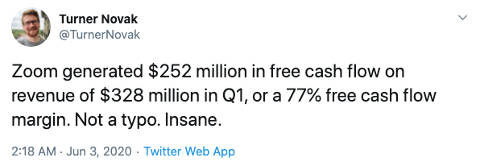[Photo by Thought Catalog on Unsplash]
Good morning,
In one of the most profound passages in AI Superpowers: China, Silicon Valley, and the New World Order, Kai-Fu Lee writes,
“For all of AI’s astounding capabilities, the one thing that only humans can provide turns out to also be exactly what is most needed in our lives: love. It’s that moment when we see our newborn babies, the feeling of love at first sight, the warm feeling from friends who listen to us empathetically, or the feeling of self-actualisation when we help someone in need. We are far from understanding the human heart, let alone replicating it. But we do know that humans are uniquely able to love and be loved, that humans want to love and be loved, and that loving and being loved are what makes our lives worthwhile.”
When Lee wrote these words it sounded philosophical. Yet, as the world goes through multiple crises, it sounds the most practical thing one can do. In no way does it imply that we should shun technology. It’s technology—tests, drugs and vaccines—that will pull the world out of the disaster it is in. But, the last few months have also shown us that technology alone is not enough. As Kai-Fu Lee writes, “This is the synthesis on which I believe we must build our shared future: on AI’s ability to think but coupled with human beings’ ability to love.”
On the subject of technology, please do take a look at This Week in Disruptive Tech newsletter from Founding Fuel. Click here to subscribe.
Wish you a lovely week ahead.
Here are three things we found interesting.
Improve access points
In the last three months, Zoom has become the go-to product for most conference calls, personal conversations and webinars. The company reported a 30-fold jump in usage in April 2020 to about 300 million daily users, and a three-fold increase in paying customers leading to a sales forecast of $1.8 billion.
What’s behind its success? ‘Ease of access’. Zoom founder Eric Yuan, a former Cisco employee, developed an interest in video-conferencing while he was trying to keep in touch with his now-wife while he was travelling on work. The idea for Zoom thus was born out of personal video-conferencing. However, Yuan designed mainly to serve large employers with sophisticated IT departments. He fixed the shortcomings of Cisco’s WebEx platform. You could Zoom on mobile phones, or through a dial-in.
As the user base expanded during the lockdown, its security issues raised concerns, It has fixed most of them. Its user interface is now more intuitive. All these could keep Zoom at the forefront of the market for some time to come, provided Yuan and his team implement their vision of “selling a full range of video, voice and chat services to a wider customer base,” as an FT analysis pointed out. Watch out for how Microsoft and Google respond.
Embrace serendipity
These days, the universe seems to be conspiring to show human beings that everything is connected. Consider this coincidence: Cyclone Nisarga’s landfall in Mumbai yesterday also happened to be the same place where RDX bombs involved in the dreadful 1993 Bombay blasts landed. The beaches of Shrivardhan.
Journalist Hussain Zaidi, the godfather of India’s underworld reporting, captured the events around the blast in a book Black Friday. The book came to the attention of a man who saw some fame as the writer of Ramgopal Varma’s Satya, but whose first directorial venture never took off. Anurag Kashyap made Black Friday into a movie starring Kay Kay Menon, Aditya Srivastava, Pavan Malhotra, all playing the real life characters of Mumbai police and underworld dons. The film was promptly banned by the Indian government. However, it started gaining a cult following as pirated DVDs were burnt and shared.
In Kashyap’s own words during a Tedx talk: “It spread the whole world over, and a lot of people saw the film. And I started to do a third film that got stopped mid-way, a fourth film that got shelved two days before the shooting was supposed to be. It was a seven-year-long traumatic period, where I was trying to figure out where do I stand, because every time I would take the film out of India, they would think that I have music, I am maybe more Bollywood and not more European, not more Universal. And when I went back home, they said that I was too European, I was not too Bollywood. It was a confusing period, not knowing where I stood.
“And that was the time when, by chance, a judge, a Supreme Court judge, saw the film in Dubai, on a pirated disk. And he was surprised, said, ‘Which film is this?’
" ‘It’s a film from your country.’
" ‘Why is it not releasing?’ He said: ‘This film should come out!’ And he came back to India and the case was reopened and the film was passed and finally released in 2007.”
However, the film didn’t do well at the box office, because people had already seen the movie on pirated DVDs.
Kashyap’s next film, Choked, is incidentally releasing on Netflix tomorrow. He recently unveiled the production company under whose banner the film will be released. It’s called Good Bad Films.
Watch Kashyap’s Ted Talk
Call out offenders
These days it’s all about wearing masks, washing hands, and maintaining distance.

(Via WhatsApp)
Is there a polite but firm way to say this? Share your stories with us. Or post on Twitter, and tag us @foundingf. Or join our Slack channel and post it there. If you aren’t there already, here is the invite code.
And if you missed previous editions of this newsletter, they’re all archived here.
Bookmark Founding Fuel’s special section on Thriving in Volatile Times. All our stories on how individuals and businesses are responding to the pandemic until now are posted there.
Warm regards,
Team Founding Fuel
June 3: Focus on little things that make a big difference, get ready for the great unlock, avoid density
Good morning,
In The Ride of a Lifetime: Lessons Learned from 15 Years as CEO of the Walt Disney Company, Robert Iger writes about the events that led to the shareholders stripping Michael Eisner’s chairmanship in 2004. Iger says Eisner was becoming increasingly pessimistic, and was communicating that pessimism to his team. “It’s ruinous to morale. It saps energy and inspiration. Decisions get made from a protective, defensive posture,” Iger writes.
“No one could have handled the stress that Michael was under perfectly, but optimism in a leader, especially in challenging times, is so vital. Pessimism leads to paranoia, which leads to defensiveness, which leads to risk aversion. Optimism sets a different machine in motion. Especially in difficult moments, the people you lead need to feel confident in your ability to focus on what matters, and not to operate from a place of defensiveness and self-preservation. This isn’t about saying things are good when they’re not, and it’s not about conveying some innate faith that ‘things will work out’. It’s about believing you and the people around you can steer toward the best outcome, and not communicating the feeling that all is lost if things don’t break your way. The tone you set as a leader has an enormous effect on the people around you. No one wants to follow a pessimist.”
It’s easy to be pessimistic these days. We only have to look around. The coronavirus pandemic shows no respite. The faultlines in the US are erupting into large-scale violence. In India, leaders who should be apologising for the distress caused to the poor and migrant workers, are blaming them for impatience. (And in India again, according to a report, someone fed a pineapple with fire-crackers to a pregnant elephant. The elephant died.)
But, pessimism will only make things worse. Leadership is in seeing the best in people even during these times and believing that we will come out of it.
Wish you a productive week ahead.
Here are three things we found interesting.
Focus on little things that make a big difference
Joanna Stern, personal tech columnist at WSJ, has put together some useful tips ranging from reminders to charge our batteries to installing don’t disturb signs. Here are two that relate to the eyes.
- Give Your Eyes Some Relief: Staring at screens a million hours a day? To reduce eye strain, try the 20-20-20 rule: Every 20 minutes look at an object 20 feet away for 20 seconds. Also, try enlarging the font size on your phone or laptops.
- Position Your Webcam Smartly: Keep a light source on your face, and try to avoid sitting with a window behind you. Frame your head and shoulders in the shot, and keep the camera lens at or above eye level—use a cardboard box to prop up the laptop if necessary.
Get ready for the great unlock
As the world prepares to resume economic and social activities, one thing is clear: we are not going back to the pre-pandemic days. Offices will be half empty, restaurants will have new rules, and the interactions will be guarded. Here are two examples from two ends of the world, one a modern Las Vegas casino, and the other a traditional Bangalore restaurant preparing for the new normal.
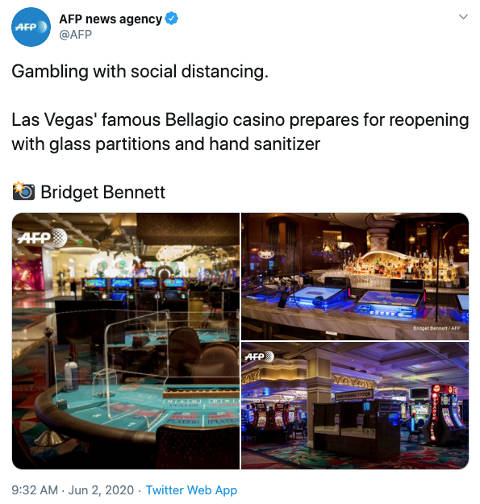
(Source: Twitter)
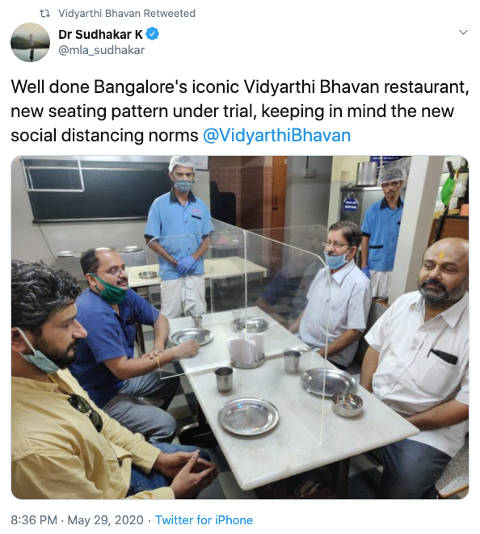
(Source: Twitter)
Avoid density
Here are two examples from Karnataka
(Warning: the videos might cause distress - here & here)
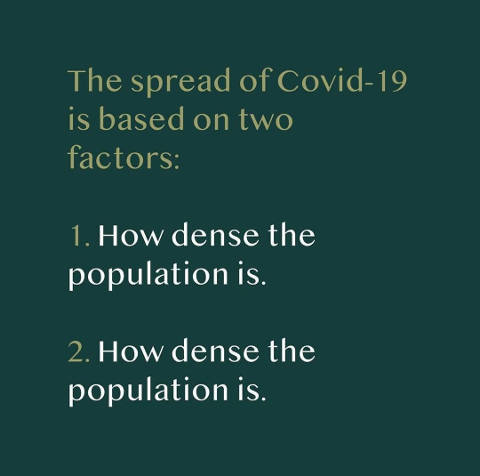
(Via WhatsApp)
Do you have tips to avoid situations like these? Share it with us. Or post on Twitter, and tag us @foundingf. Or join our Slack channel and post it there. If you aren’t there already, here is the invite code.
And if you missed previous editions of this newsletter, they’re all archived here.
Bookmark Founding Fuel’s special section on Thriving in Volatile Times. All our stories on how individuals and businesses are responding to the pandemic until now are posted there.
Warm regards,
Team Founding Fuel
June 2: Mind the salary gap, turn on the TVs for school education, maintain physical distance
Good morning,
In a series of interviews he gave to Tom Plate for the book Conversations with Lee Kuan Yew, the late patriarch of the city-state Singapore shared this about his approach to work and life.
“I am not great on philosophy and theories. I am interested in them, but my life is not guided by philosophy or theories. I get things done and leave others to extract the principles from my successful solutions. I do not work on a theory. Instead, I ask: what will make this work? If, after a series of such solutions, I find that a certain approach worked, then I try to find out what was the principle behind the solution.
“What is my guiding principle? Presented with the difficulty or major problem or an assortment of conflicting facts, I review what alternatives I have if my proposed solution doesn’t work. I choose a solution which offers a higher probability of success, but if it fails, I have some other way. Never a dead end.”
The biggest advantage of such pragmatism is that you have many tools in your toolbox, and you are not averse to switching if one doesn’t work.
Have a great day ahead.
Here are three things we found interesting.
Mind the gap
Recently, Infosys announced that it is increasing the compensation of its CEO, Salil Parekh, by 27% to $6 million, striking a discordant note in these troubled times. As we enter the results season, one can expect more attention being paid to CEO pay. In People Matters Visty Banaji points out that, in India “the top decile of highest-paid employees earn 10.9 times as much as those in the bottom decile (while the top 1 percent earn 33 times as much as the bottom decile!)”
While such ratios offer a good thumb rule to watch out for unequal pay, they don’t solve another crucial problem. As the title of a paper by Marianne Bertrand and Sendhil Mullainathan puts it, “Are CEOs rewarded for luck?” The answer lies in how strong the board is. Improve corporate governance—with smaller boards, presence of large shareholder(s) on boards, a larger share of outsiders on boards—and the chances of CEOs getting rewarded for luck go down.
Dig deeper
But who will guard the guardians? By Visty Banaji
Luck and CEO pay interview with Marianne Bertrand
Turn on the TVs
A recent report Schools in the Times of COVID-19 by Azim Premji Foundation points out that the persistent digital divide in India will leave many schoolchildren out of online classes. Only 11% of households in India own a computer, and even smartphones (which aren’t as convenient as computers for lengthy tasks) are owned only by 7-10% of families in rural India.
What’s the way out? Many states are planning to telecast classes over television, even as schools reopened for a new term. In Kerala, Mint reports, “classes will be streamed on a free, public-run television channel available on cable networks, direct-to-home services and over the internet.” Similarly, The Print reported earlier that each class from 1st to 12th will have a dedicated channel.
This doesn’t exactly solve the problem—in households with many children and in places where power cuts are frequent—but it’s an improvement over online-only education.
Dig deeper
Govt turns to ‘TV classrooms’ as online lessons prove to be a challenge during lockdown
Kerala schools reopen today, lessons to be telecast, delivered online
Maintain physical distance
But, it’s not going be easy
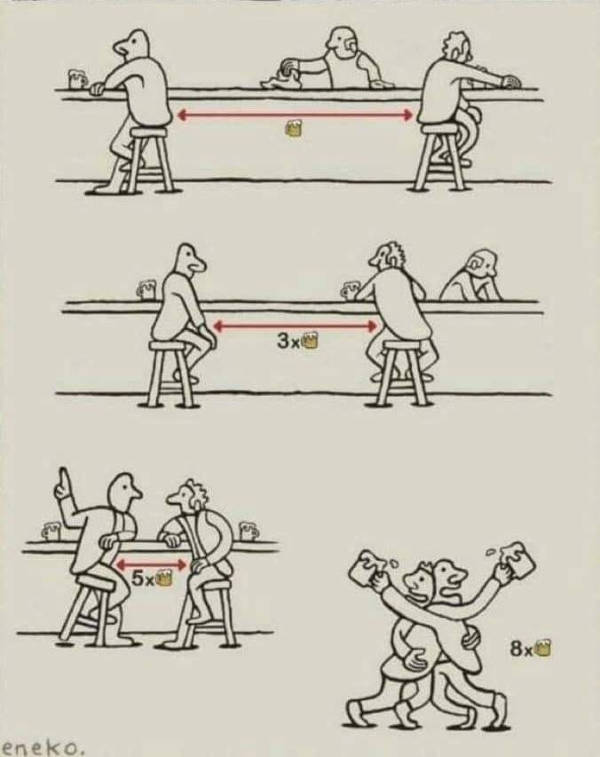
(Via WhatsApp)
Do you have tips to avoid situations like these? Share it with us. Or post on Twitter, and tag us @foundingf. Or join our Slack channel and post it there. If you aren’t there already, here is the invite code.
And if you missed previous editions of this newsletter, they’re all archived here.
Bookmark Founding Fuel’s special section on Thriving in Volatile Times. All our stories on how individuals and businesses are responding to the pandemic until now are posted there.
Warm regards,
Team Founding Fuel


